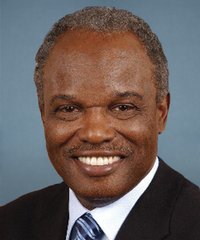
U.S. Representative David Scott
In 2002, David Scott was elected to the United States Congress. He is currently in his tenth term representing Georgia's Thirteenth Congressional District, which includes 6 counties around metro Atlanta: Cobb, Clayton, Douglas, Fayette, Fulton and Henry. He began his public service by being elected to the Georgia General Assembly in 1974.
In Congress, David Scott is a strong voice for farmers, jobs, healthcare, education, our veterans, our children, and transportation. He serves on the Financial Services Committee, Agriculture Committee, and the NATO Parliamentary Assembly. He has authored several laws including student loan repayment assistance for law students who become public prosecutors and defenders so that top attorneys will be attracted to public service. Congressman Scott secured $80 million in funding in the 2018 Farm Bill for agriculture-focused scholarships at the 19 Historically Black 1890’s Land-Grant Colleges and Universities across the country. He also recognized the importance of Fathers by adding Father’s Day to the U.S. Flag Code as a day of special significance. He bridged political gridlock to achieve National Heritage Area designation for the Arabia Mountain in metro Atlanta.
I am honored to serve as Chairman of the Committee on Agriculture. I take this leadership role seriously and advocate for policies that benefit Americans and Georgians alike. As Chairman, I have worked hard to advance initiatives that will promote Georgia’s farmers and agribusinesses, both in urban and rural communities. Currently, the agricultural economy is suffering—the Trump Administration’s foolhardy trade wars, more frequent natural disasters and a credit crunch for farmers have created a financial environment that is unsustainable. There is also an aging labor force in agriculture that worsens by the day. Every year the number of students graduating in an agriculture related field of study is steadily declining, especially among students of color. This is why in the 2018 Farm Bill I spearheaded a scholarship program supporting the 19, 1890s Land-Grant Universities and Colleges, like Fort Valley State University. The scholarship incentivizes students at these universities to specialize in agricultural science, food science, agribusiness, and other agriculture related studies. The scholarship program aims to cultivate the next diverse generation of agriculture leadership.
In July 2019, I also led a Subcommittee hearing highlighting the need for high-speed broadband infrastructure in rural America, to bolster and protect rural economies. In Georgia, 7 rural hospitals have closed since 2010, and broadband infrastructure development will help rural Georgians access tele-health services and allow rural hospitals to thrive. I will continue to promote broadband access as infrastructure development is considered by the House of Representatives.
Unfortunately, food deserts are also a growing concern for Georgians, especially those who live in the metro-Atlanta area. These communities struggle with access to quality fresh, nutritious foods and produce and often pay more for less healthy foods located at convenience stores. Federal programs such as the Special Supplemental Nutrition Program for Women, Infants, and Children (WIC) Farmers Market Nutrition Program (FMNP) help combat the negative effects of food deserts. This key program also enables farmers to sell healthy produce at local farmers markets. For Fiscal Year 2020, I supported robust funding to WIC-FMNP to help address food insecurity in Georgia, because every Georgian should have access to healthy and nutritious produce to provide healthy meals at home.
Energy prices also continue to put a strain on American families, therefore I have continued to support affordable, sustainable, and cleaner sources of energy, as well as funding to improve energy efficiency. It is imperative that the federal government use its position to support the smart use of energy, in order to reduce cost and waste. In addition to efficiency, I support the use of energy sources like biomass, wind, solar and nuclear where feasible. Renewable energy also has the ability to move our country away from a dependence on foreign sources of energy and become more self-sufficient. The use of clean forms of energy can also help to protect the environment and improve the quality of our air and water, as well as conserve natural areas.
Moreover, the 13th District experiences some of the worst traffic in the country, contributing to poor air quality and thus affecting the health of the most vulnerable residents in the area. I support the use of evidence-based science to develop sensible environmental protection initiatives in Congress that protect the health of my constituents. Equally important is the promotion of clean infrastructure plans to reduce the production of greenhouse gases and other toxic chemicals. Congress must also ensure that the modernization of rural waste water systems is prioritized in future infrastructure plans. Improved waste water systems are critical in protecting wildlife and environmental health, as well as that of Georgia’s citizens.
Also, as climate change worsens, I have worked closely with my colleagues in the House of Representatives to support evidence-based approaches in protecting our environment for the benefit of future generations of Georgians. Climatologists and environmental advocacy organizations predict Georgia will face an increase in droughts and extreme heat days as a result of worsening climate conditions. These conditions will pose a public health risk to vulnerable populations, including the elderly, pregnant women, and children. These conditions also pose risks to wildlife, oceans and air quality. Unfortunately, the Trump Administration has shown a lack of concern and action toward worsening climate conditions. That’s why, with the environment and economy in mind, I was proud to support and vote in favor of H.R. 9, the Climate Action Now Act, which requires the U.S. to rejoin the Paris Agreement—an international movement to combat the effects of climate change.